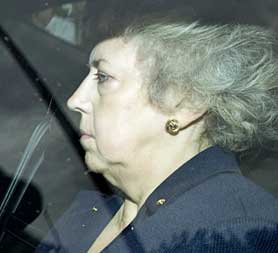Ex-MI5 chief: Iraq, Afghanistan radicalised youth
The former head of MI5 says that Britain’s involvement in the Iraq war “radicalised young people”, as Channel 4 News’ Jonathan Rugman reports on Baroness Manningham-Buller’s “haunting” statement.
In damning evidence Baroness Manningham-Buller told Sir John Chilcot’s inquiry: “Our involvement in Iraq radicalised, for want of a better word, a whole generation of young people – not a whole generation, a few among a generation – who saw our involvement in Iraq and Afghanistan as being an attack on Islam.”
She said MI5 had to have its budget doubled after the conflict because of the huge surge in the terrorist threat – which had, she said, been “almost overwhelming”.
She said the overthrow of Saddam Hussein had allowed al-Qaida to establish itself in Iraq for the first time.
Baroness Manningham-Buller: 'I should have challenged more'
The testimony from the former head of MI5 was among the most damning the Iraq inquiry has heard, because it flatly contradicts much of what the Bush and Blair administrations told us about the Saddam threat in the run-up to the Iraq war.
Baroness Manningham-Buller says the intelligence services advised the government ahead of time that Saddam was "containable" – and that the al-Qaida threat to the UK would increase with the Iraq invasion.
"I have often thought whether my predecessor or I should have challenged more,” Baroness Manningham-Buller told the Chilcot inquiry in the most haunting quotation of the day, revealing that she did not have regular one-on-one meetings with Tony Blair and that the head of MI6 saw the prime minister more often.
By law, the head of MI5 has direct access to the prime minister. Why she did not seek that access with some urgency, and speak out more forcefully when it mattered, is something the baroness will have to live with for the rest of her days.
Read more from Jonathan Rugman: 'I should have challenged more'

“Arguably we gave Osama Bin Laden his Iraqi jihad”, she told the inquiry.
Lady Manningham-Buller said MI5 hadn’t foreseen the number of Britons who were drawn into terrorist plots after the invasion – in other words, the “home-grown” threat. But she said she wasn’t surprised that some Britons were involved in the 7/7 bombings in London.
In 2002, a year before the invasion, the intelligence services had rated the direct threat from Iraq as low. But she said the conflict had “substantially” increased that threat.
“What Iraq did was produce a fresh impetus to people prepared to engage in terrorism”, she went on.
In a newly declassified document, Lady Manningham-Buller rejected the suggestion that Iraq had any involvement with the 9/11 attacks.
She said: “There is no credible intelligence to suggest that connection.”
The CIA had agreed with that view, she asserted – prompting the former US defence secretary Donald Rumsfeld to set up “an alternative intelligence unit in the Pentagon to seek an alternative judgement”.
There was a key exchange over the risks that WMD produced by Iraq might fall into the hands of extremists – as Tony Blair (see his Who Knows Who map) had argued during the run-up to the invasion.
Inquiry panel member Sir Roderic Lyne asked: “In your view, did the toppling of Saddam Hussein eliminate a threat of terrorism from his regime?”
Lady Manningham-Buller replied it had eliminated the direct threat, but not the potential risks that other terror groups might use chemical or biological weapons in future.
Asked about the government’s now notorious 2002 dossier on Iraq’s supposed WMD, she revealed that MI5 had refused to contribute: “we didn’t think it was reliable“, she said – calling the intelligence on Iraqi WMD, which was used to justify the invasion, “fragmentary”.
And she pointed to another consequence of the decision to go to war in Iraq, saying it had reduced the focus on the al-Qaida threat in Afghanistan – something, she said, that was “a long-term major and strategic problem”.